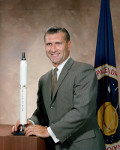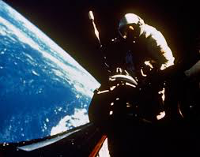Dick Gordon was an astronaut and Navy pilot most well-known for commanding the Apollo 12 mission, which landed men on the Moon. He was born in Seattle on Oct. 5, 1929. He graduated from North Kitsap High School in Poulsbo, Wash., in 1947 and earned and a bachelor of science degree in chemistry from the University of Washington in 1951. 
Gordon embarked on a career with the Navy, earning his pilot's wings in 1953, attending flight school and serving with an all-weather fighter squadron in Jacksonville, Fla., before going to Naval Test Pilot School at Patuxent River, Md. His next stint was as a flight instructor at the Miramar (Calif.) Naval Air Station. In all, he logged more than 4,500 of flying time. One of his more notable accomplishment was the claiming of the Bendix Trophy, awarded to the winner of an aerial race from Los Angeles in New York. Gordon won the race in 1961, setting a new speed record in the process. He joined the National Aeronautics and Space Administration (NASA) as an astronaut in 1963. 
Gordon was the pilot on Gemini 11, completing two spacewalks. He fed back difficulties that he overcame with his spacewalks, and subsequent astronauts who performed spacewalks greatly benefited from his insights. His crewmate for Gemini 11 was Pete Conrad. He was the backup Command Module Pilot for Apollo 9 and then was in the mission command seat for Apollo 12. On his crew was Conrad, his Gemini 11 crewmate, and space rookie Alan Bean. Among the incidents that Gordon and his crew overcame was a lightning strike just before takeoff. 
The crew did three television broadcasts during their journey, showing the inside of the command module and shots of first the Earth and then the Moon. The lunar module crew of Apollo 12 improved on the landing achieved by the Apollo 11 crew of Neil Armstrong and Buzz Aldrin by landing very close to their intended target. The Surveyor III spacecraft had touched down on the lunar surface on April 20, 1967, and Bean and Conrad set down the lunar module just 600 feet away, in the Ocean of Storms, on November 19. Gordon, circling overhead in Yankee Clipper, the Command Module, snapped lots of photos of the lunar surface and kept close tabs on his crewmates, who performed a variety of experiments on the lunar surface, some repeats of what the Apollo 11 crew had done and some new. The rendezvous went according to plan, as did the trip back. Splashdown was in the Pacific Ocean on November 24. Gordon stayed in the astronaut program, serving as backup commander for Apollo 15. He was scheduled to be in command for Apollo 18, but that mission never flew because of budget cuts. In 1972, Gordon left NASA and the Navy and went to work in the private sector. One of Gordon's later endeavors that echoed his space mission experience was as advisor for a TV miniseries based on the James A. Michener book Space; one of the scenarios detailed in the novel was an Apollo 18 mission the crew of which encountered dangers on the lunar surface. Gordon played the part of Capcom in the show as well. Gordon got involved in professional sports as well, serving as executive vice president of the pro football team the New Orleans Saints. His friend John Mecom, Jr., owned the team. Other private sector positions for Gordon were in the engineering, technology and oil and gas industries. He died on Nov. 6, 2017. He was 88. He had married twice and had six children. |
|
Social Studies for Kids
copyright 2002–2026
David White




